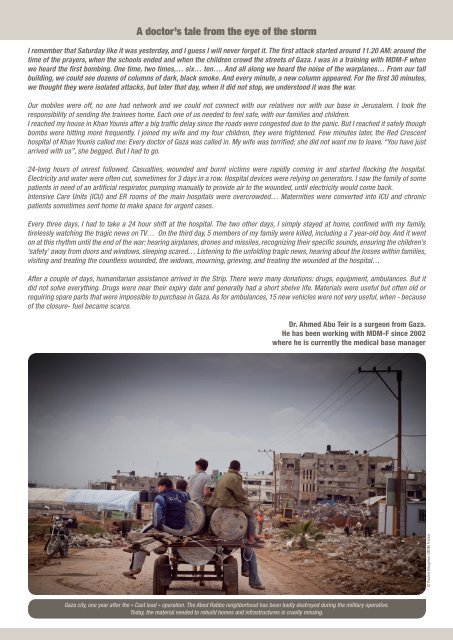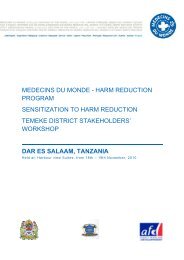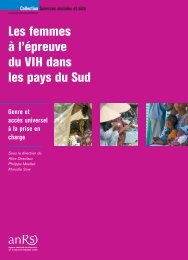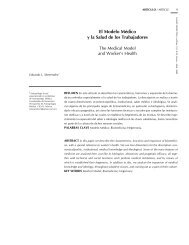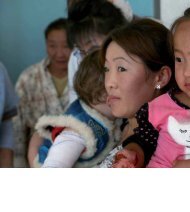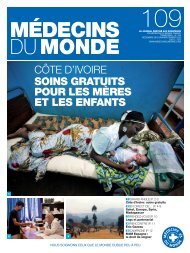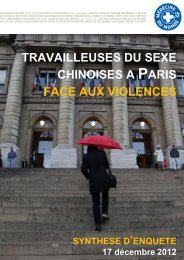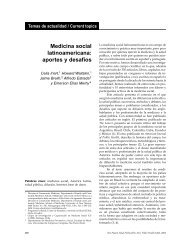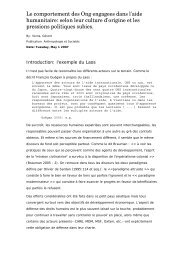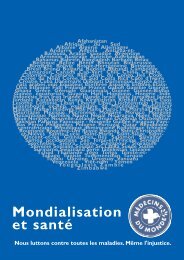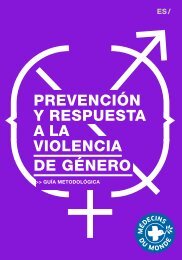Gaza: a health care system impeded - Médecins du Monde
Gaza: a health care system impeded - Médecins du Monde
Gaza: a health care system impeded - Médecins du Monde
- No tags were found...
Create successful ePaper yourself
Turn your PDF publications into a flip-book with our unique Google optimized e-Paper software.
A doctor’s tale from the eye of the stormI remember that Saturday like it was yesterday, and I guess I will never forget it. The first attack started around 11.20 AM: around thetime of the prayers, when the schools ended and when the children crowd the streets of <strong>Gaza</strong>. I was in a training with MDM-F whenwe heard the first bombing. One time, two times,… six… ten…. And all along we heard the noise of the warplanes… From our tallbuilding, we could see dozens of columns of dark, black smoke. And every minute, a new column appeared. For the first 30 minutes,we thought they were isolated attacks, but later that day, when it did not stop, we understood it was the war.Our mobiles were off, no one had network and we could not connect with our relatives nor with our base in Jerusalem. I took theresponsibility of sending the trainees home. Each one of us needed to feel safe, with our families and children.I reached my house in Khan Younis after a big traffic delay since the roads were congested <strong>du</strong>e to the panic. But I reached it safely thoughbombs were hitting more frequently. I joined my wife and my four children, they were frightened. Few minutes later, the Red Crescenthospital of Khan Younis called me: Every doctor of <strong>Gaza</strong> was called in. My wife was terrified; she did not want me to leave. “You have justarrived with us”, she begged. But I had to go.24-long hours of unrest followed. Casualties, wounded and burnt victims were rapidly coming in and started flocking the hospital.Electricity and water were often cut, sometimes for 3 days in a row. Hospital devices were relying on generators. I saw the family of somepatients in need of an artificial respirator, pumping manually to provide air to the wounded, until electricity would come back.Intensive Care Units (ICU) and ER rooms of the main hospitals were overcrowded… Maternities were converted into ICU and chronicpatients sometimes sent home to make space for urgent cases.Every three days, I had to take a 24 hour shift at the hospital. The two other days, I simply stayed at home, confined with my family,tirelessly watching the tragic news on TV… On the third day, 5 members of my family were killed, including a 7 year-old boy. And it wenton at this rhythm until the end of the war: hearing airplanes, drones and missiles, recognizing their specific sounds, ensuring the children’s‘safety’ away from doors and windows, sleeping s<strong>care</strong>d… Listening to the unfolding tragic news, hearing about the losses within families,visiting and treating the countless wounded, the widows, mourning, grieving, and treating the wounded at the hospital…After a couple of days, humanitarian assistance arrived in the Strip. There were many donations: drugs, equipment, ambulances. But itdid not solve everything. Drugs were near their expiry date and generally had a short shelve life. Materials were useful but often old orrequiring spare parts that were impossible to purchase in <strong>Gaza</strong>. As for ambulances, 15 new vehicles were not very useful, when - becauseof the closure- fuel became scarce.Dr. Ahmed Abu Teir is a surgeon from <strong>Gaza</strong>.He has been working with MDM-F since 2002where he is currently the medical base manager© Pauline Beugnies I MDM France<strong>Gaza</strong> city, one year after the « Cast lead » operation. The Abed Rabbo neighborhood has been badly destroyed <strong>du</strong>ring the military operation.Today, the material needed to rebuild homes and infrastructures is cruelly missing.


